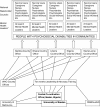The Mental Health Leadership and Advocacy Program (mhLAP): a pioneering response to the neglect of mental health in Anglophone West Africa
- PMID: 24467884
- PMCID: PMC3931322
- DOI: 10.1186/1752-4458-8-5
The Mental Health Leadership and Advocacy Program (mhLAP): a pioneering response to the neglect of mental health in Anglophone West Africa
Abstract
Developing countries in Africa and other regions share a similar profile of insufficient human resources for mental health, poor funding, a high unmet need for services and a low official prioritisation of mental health. This situation is worsened by misconceptions about the causes of mental disorders, stigma and discrimination that frequently result in harmful practices against persons with mental illness. Previous explorations of the required response to these challenges have identified the need for strong leadership and consistent advocacy as potential drivers of the desired change. The Mental Health Leadership and Advocacy Program (mhLAP) is a project that aims to provide and enhance the acquisition of skills in mental health leadership, service development, advocacy and policy planning and to build partnerships for action. Launched in 2010 to serve the Anglophone countries of The Gambia, Ghana, Liberia, Nigeria, Sierra Leone, this paper describes the components of the program, the experience gained since its initiation, and the achievements made during the three years of its implementation. These achievements include: 1) the annual training in mental health leadership and advocacy which has graduated 96 participants from 9 different African countries and 2) the establishment of a broad coalition of service user groups, non-governmental organizations, media practitioners and mental health professionals in each participating country to implement concerted mental health advocacy efforts that are focused on country-specific priorities.
Figures
References
-
- Oshodi YO, Abdulmalik J, Ola B, James BO, Bonetto C, Cristofalo D, Van Bortel T, Sartorius N, Thornicroft G. Pattern of experienced and anticipated discrimination among people with depression in Nigeria: a cross-sectional study. Soc Psychiatry Psychiatr Epidemiol. 2013. Epub ahead of print. doi:10.1007/s00127-013-0737-4. - PubMed
-
- Patel V, Minas H, Cohen A, Prince M. Global mental health: principles and practice. New York: Oxford University Press; 2013.
LinkOut - more resources
Full Text Sources
Other Literature Sources


